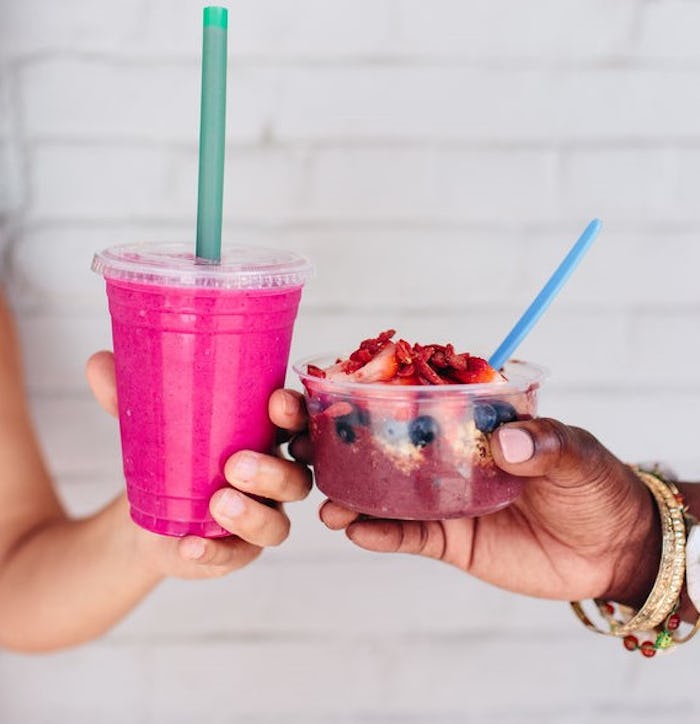Life
9 Seemingly Healthy Foods That Are Actually Bad For You
Deciding to eat healthier is a smart move, but it isn't always easy. Sometimes, choosing which foods are actually healthy can be something of a chore. When so many seemingly healthy foods are actually bad for you, it can be difficult to tell friend from foe in the food world. However, learning more about these misleading food options now could help you make healthier choices in the future.
There's a pretty strong consensus about which ingredients in food are generally unhealthy. "Sodium, sugar and fat (saturated fat and trans-fat) are key ingredients one should always monitor when eating out and shopping at the grocery store," Vilma Andari, M.S., said to the American Heart Association (AHA). "The American Heart Association recommends keeping the consumption of saturated fat to less than 7 percent and the consumption of trans-fat to less than 1 percent of an individual’s daily calories." Salt consumption should max out at 1,500 milligrams per day, and no more than 6 teaspoons of sugar a day are recommended, as further explained by the AHA. Although it should be easy to watch out for excess amounts of fat, sugar, and salt in most foods, some sneaky eats can contain a surprising amount of these ingredients. Read on to learn more about the foods that might not be that healthy in reality.
1Granola
Crunchy granola is sometimes portrayed as the ultimate health food, but this may not be the case. "When I think of granola, I think of piles of sugar," said registered dietitian Cassie Bjork in The New York Times. "It’s advertised as a healthy choice. But the reality is that it’s usually not." Most store-bought granola cereals contain enough sugar to make it comparable to cake, as further explained in the article.
2Fruit Juices
Juice can be pretty deceptive. Although 100 percent fruit juice may contain vitamin C and potassium, it can also provide a pretty big hit of sugar and calories, too, according to WebMD. Plus, juice doesn't contain the fiber you would get from eating the whole fruit.
3Pretzels
Pretzels may look like one of the healthier options in an average vending machine, but this doesn't make them a health food. In fact, pretzels are just refined carbs with a whopping dose of salt, as registered dietitian Keri Glassman explained in TODAY.
4Tea Drinks
Bottled tea drinks may contain a few surprising extra ingredients. In fact, some commercially available sweetened teas contain more sugar than soda, according to Business Insider. If you're a tea fanatic, then consider brewing your own at home to monitor the sugar input.
5Frozen Yogurt
Frozen yogurt is pretty healthy, right? Well, even the plain flavor at most yogurt shops can contain about 20 grams of sugar, according to Shape. This is before adding any of those toppings, too.
6Restaurant Salads
Even salads aren't always the healthiest choice. In fact, some restaurant salads can contain thousands of calories and over a day's worth of sodium, according to Eat This, Not That! The sauces and toppings can sneak in salt, sugar, and fat.
7Dried Fruit
Granted, this isn't the worst food ever. But dried fruit can be high in sugar and caloric concentration, according to Healthline. It's OK to enjoy in moderation for most people, though.
8Store-Bought Salad Dressings
Many commercially available salad dressings can contain unhealthy ingredients such as added sugars, high-fructose corn syrups, and trans fats, according to Harvard Health Publishing. That said, it's pretty easy to make your own salad dressing at home, according to Bustle.
9Some Sushi Rolls
Not all sushi rolls can be considered health foods. Some of the more elaborate creations, such as shrimp tempura rolls, can contain extra calories and fat, according to WebMD. Fried foods and heavy sauces in the rolls can decrease the health factor. Whether you're at the sushi bar or the grocery store, it helps to be aware of the foods that can sneak in extra sodium, fat, and sugar. And if you're (understandably) baffled by all these choices, don't hesitate to ask your doctor for dietary advice.
